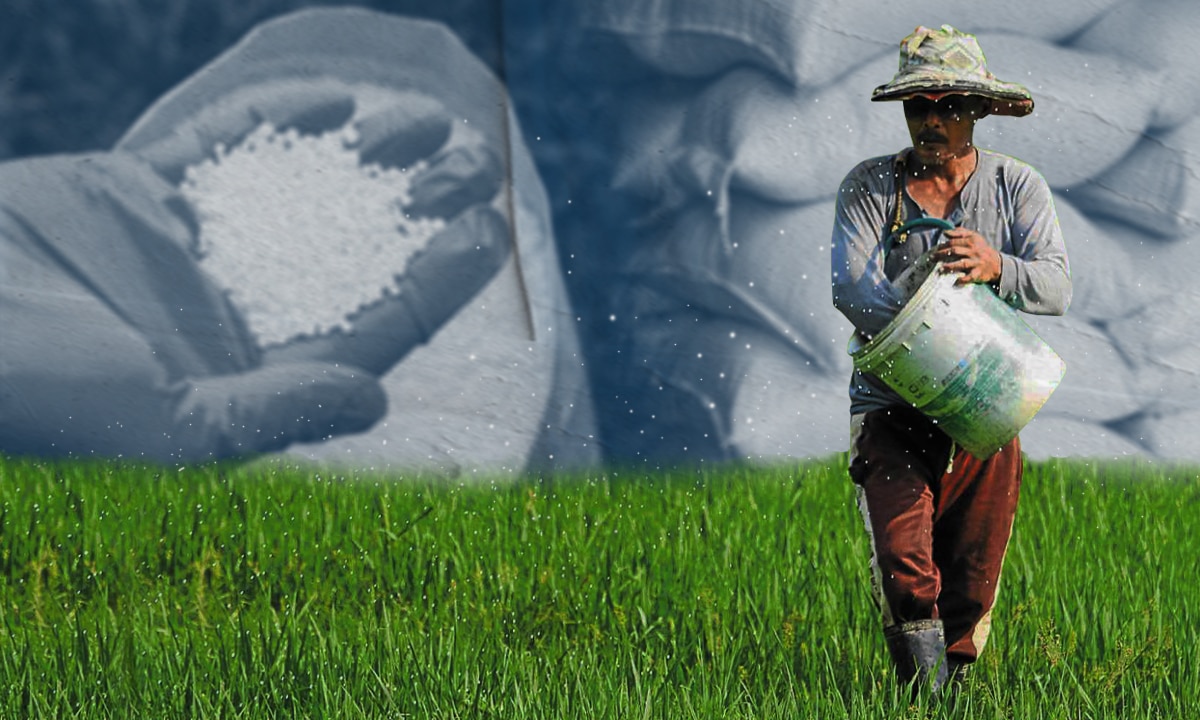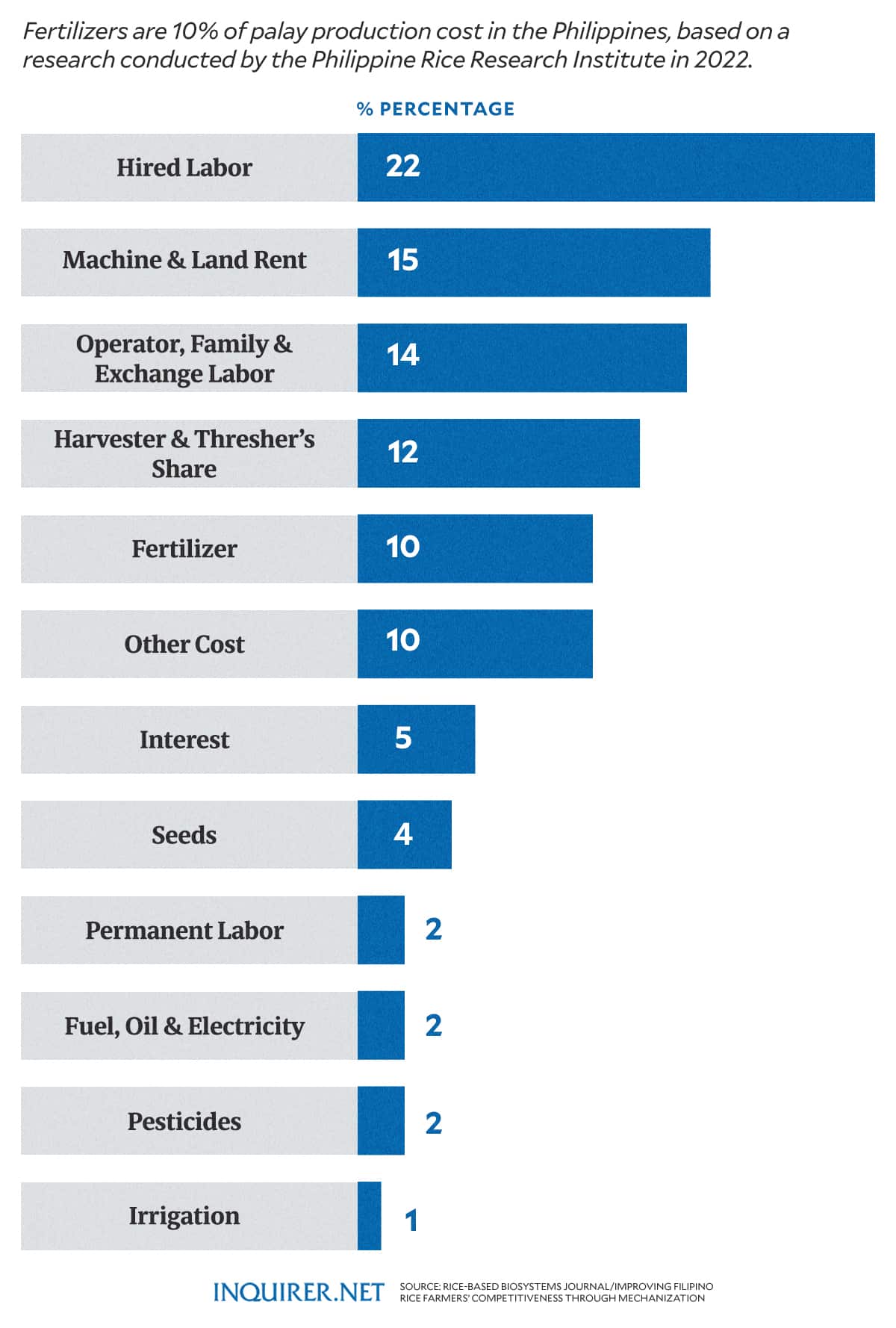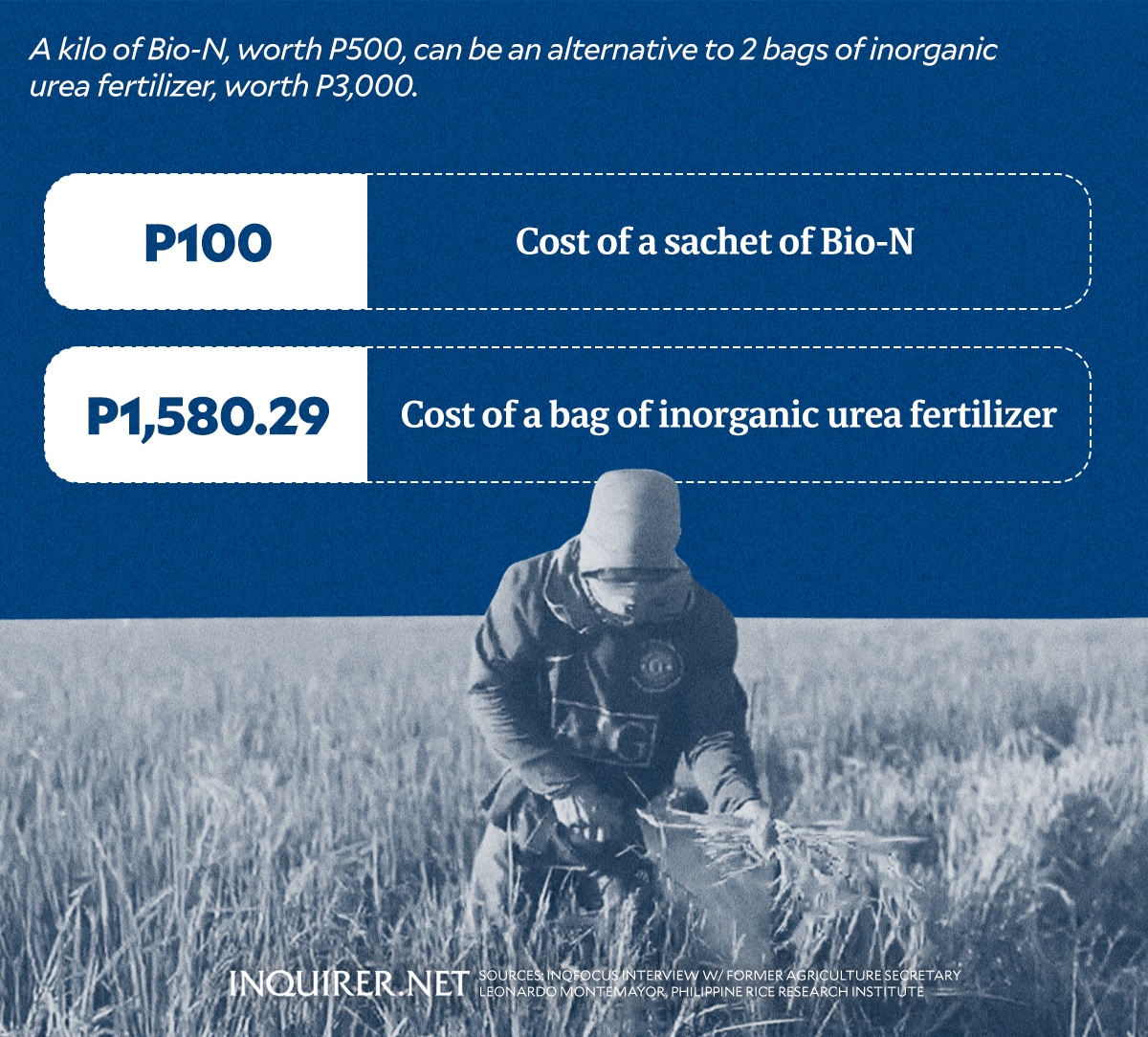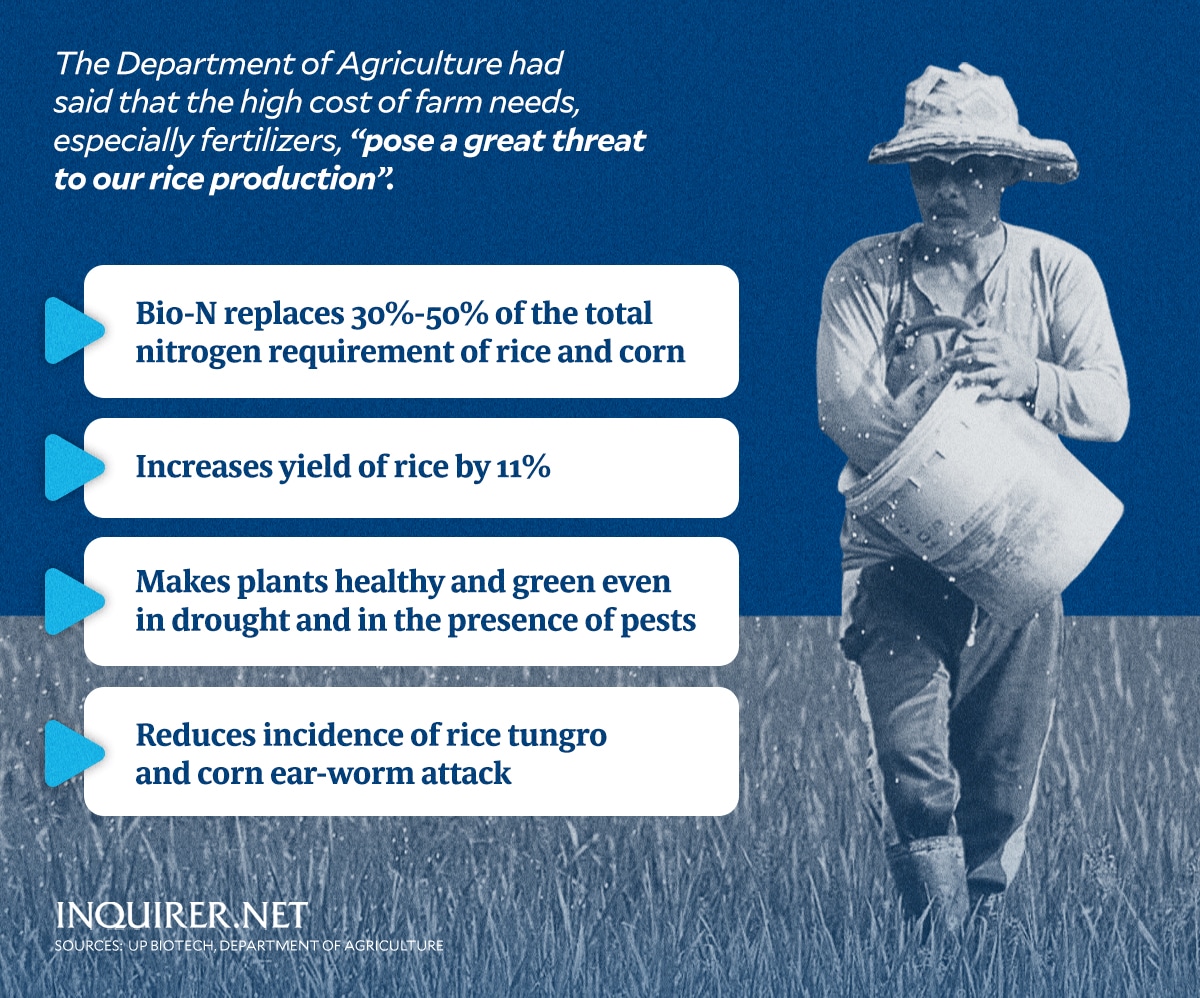lccplus Bio-N: Cheaper PH-made fertilizer in chains


FERTILIZER composite image from Inquirer file/stock photos
MANILA, Philippines—No less than the Department of Agriculture (DA) had said that the high cost of farm inputs, especially fertilizers, “pose a great threat to our rice production.”
But as it said last year, the consequences of high palay production cost can be mitigated with the use of biofertilizers, which it said, is significant in achieving a rice-resilient Philippines.
Article continues after this advertisementThe Philippine Rice Research Institute (PhilRice) stated that as of 2022, P14.98 is required to produce a kilo of rice, and based on a research done in the same year, 10 percent of expenses is spent on fertilizers.
FEATURED STORIES NEWSINFO Taguba says he never changed tune on Paolo Duterte NEWSINFO VP Sara Duterte amid political heat: ‘We will not break’ NEWSINFO LPA formation between Visayas and Mindanao likely this weekend – Pagasa

GRAPHIC: Ed Lustan/INQUIRER.net
As the DA explained, biofertilizers contain living microorganisms that promote growth by increasing the supply or availability of nutrients to the plant while improving soil health.
RELATED STORY: Bio-fertilizer use eyed to aid corn farmers
Article continues after this advertisementBack in 1985, a research team from the University of the Philippines Los Baños (UPLB) led by Dr. Mercedes Garcia, initiated the development of Bio-N from the bacteria isolated from talahib.
Article continues after this advertisementThe microorganisms were eventually screened and were found to be effective in improving nitrogen intake of rice, corn, and vegetables. Eventually, it was said to have improved yield.
Article continues after this advertisementUPLB’s Institute of Molecular Biology and Biotechnology (Biotech) explained that Bio-N can replace 30 percent to 50 percent of the total nitrogen requirement of rice and corn, and reduces incidence of rice tungro and corn ear-worm attack.


GRAPHIC: Ed Lustan/INQUIRER.net
However, almost 40 years later, the Federation of Free Farmers (FFF) said that “the once promising biofertilizer industry is in crisis and heading into paralysis” because of what it described as a “unilateral action” by UPLB Chancellor Jose Camacho Jr.
Article continues after this advertisement Exclusive licenseBased on a column by economist Cielito Habito, it was over 20 years ago when the DA first adopted Bio-N in a 2003 agreement with UPLB-Biotech. The institute was asked to produce Bio-N for the DA and local governments.
READ: Let’s push renewable fertilizers
However, UPLB-Biotech “lacked production capacity”, he said, pointing out that since 2003, only less than one percent of biofertilizer needs all over the Philippines was served.
So in 2023, UPLB signed a licensing agreement with AgriSpecialist Inc. (ASI), a company based in Laguna that was established by Mario Labadan Jr. “to commercialize and distribute” Bio-N.
INQUIRER.net has reached out to the Office of the UPLB Chancellor, but Camacho has yet to respond to a request for comment on the statement made by the FFF last week, Nov. 18.
As stated on Biotech’s website, Bio-N, as of March 2023, “has been exclusively licensed to AgriSpecialist Inc. to improve access for farmers in need of safe, effective, and low cost fertilizer.”
But as FFF Board Chairman Leonardo Montemayor, who served as agriculture secretary from 2001 to 2002, pointed out, how can Bio-N “become the sole property of UPLB or ASI” when it was developed with the use of public resources.
Financed by gov’tMontemayor said that Bio-N, which enables rice and corn to use nitrogen from the air, was developed at Biotech with financial support from government offices such as the DA and the Department of Science and Technology.
The DA and its attached agencies, like the National Food Authority, collaborated with Biotech, local governments, schools, private companies, and farmers’ cooperatives in establishing 83 mixing plants to produce and/or distribute Bio-N to farmers.
RELATED STORY: Marcos says biofertilizers to be introduced to local farmers
Montemayor said that a kilo of Bio-N, worth P500, can be an alternative to two bags of inorganic urea fertilizer, worth P3,000. Its application may include seed inoculation, direct broadcasting over seeds, or root-dipping in mixed water.


GRAPHIC: Ed Lustan/INQUIRER.net
He told INQUIRER.net, however, that Bio-N cannot totally replace inorganic fertilizer as the two can be applied together in a balanced fertilization approach, so that farmers can save on costs and environmental impact will be less.
As pointed out by Biotech, farmers can produce at a lower cost while increasing yield and income as research indicated that Bio-N could increase rice and corn yield by 11 percent.
Back in 2022, William Dar, who was agriculture secretary then, said that “given the exigencies of the times, we have to massively promote the use of Filipino-developed technologies to enhance crop productivity and incomes.”
‘Bad precedent’For Montemayor, the reason for the grant of exclusive license to ASI could be for UPLB “to earn more royalties” and perhaps to upscale production through a private partner because UPLB does not have resources to do so.
But the move, he said, has set a bad precedent because Bio-N is “supposed to be [a] public good” and available to all, saying that it is important for the government to keep its rights to ensure that Bio-N remains affordable and accessible to farmers.
This, as in 2022, the DA said that five to six sachets of Bio-N can be an alternative to two 50-kilogram bags of urea for every hectare of palay. Urea then retailed from as low as P2,500 each bag to as high as P3,147.
It said that for every hectare, the total fertilizer cost would mean P11,294 at the average of four bags each hectare: “With Bio-N, priced at P100 per sachet, rice farmers could save P10,694 per hectare for utilizing five to six sachets,” Montemayor said.
For Montermayor, all the national government agencies and local governments that contributed resources to Bio-N should also be entitled to royalties, unhampered access to the technology, and a say in its disposition.
Subscribe to our daily newsletter
FFF called on Congress and the executive branch of the government to investigate the issue of Bio-N being exclusively licensed to ASI as it could impact food security and farmers’ incomes.lccplus
READ NEXT House panel urged to postpone hearing so VP Duterte could face... De Lima: ‘We are pleased that state is beginning to act&... EDITORS' PICK Manila Water to customers: Include septic tank desludging in holiday checklist Marcos says he ordered impeachment moves vs VP Sara Duterte stopped PhilHealth to cover basic oral healthcare services VP Sara Duterte amid political heat: ‘We will not break’ Manileños push for Isko return, highlighting city’s CMCI honors South Korea scrambles jets as Chinese, Russian warplanes approach MOST READ Comelec junks plea of 18 nuisance bets, one of them to seek SC's help South Korea scrambles jets as Chinese, Russian warplanes approach Taguba says he never changed tune on Paolo Duterte Marcos says he ordered impeachment moves vs VP Sara Duterte stopped Follow @FMangosingINQ on Twitter --> View comments
